2024 KTM 990 Duke Review – First Ride

The middle Duke is giving off big brother vibes
It’s no secret that we at Motorcycle.com love KTM’s 790 and 890 Duke (and really love the 890 Duke R). Long-time readers will know this already, but if you’re new here, our history with the middle Duke family runs deep. Type in either 790 or 890 Duke in our search bar and you’ll see the myriad of stories and tests we’ve done with those bikes. Like these:
2024 KTM 990 Duke
Billed as a mini Super Duke, the 990 Duke sheds the 890's kid gloves by virtue of it being sharper, stiffer, and more focused.
Editor Score: 90.5%
Engine | 19/20 | Suspension | 13.5/15 | Transmission | 8.5/10 |
Brakes | 8.5/10 | Instruments | 4/5 | Ergonomics | 9/10 |
Appearance | 9/10 | Desirability | 9/10 | Value | 10/10 |
Highs
- The LC8c engine proves bigger is better
- Razor-sharp chassis
- All the fun of the Super Duke without the insanity
Sighs
- Slightly soft brake lever feel
- If you were hoping for an 890 Duke, just with more power, think again
- That headlight – you either love it or hate it
With the news that KTM was closing the door on the 890 Duke chapter in order to make room for the new 990, we said goodbye to the 890 in the only way we knew how – by sticking it in one final test to see how it would fare against its contemporaries. Guess what – it won.
It’s with these impressions of the 890 fresh in my mind that I traveled to Spain to get a taste of the new 990 Duke. Could one of my favorite bikes be made even better? After half a day of hauling ass through the Spanish countryside aboard the new 990 Duke, I strolled back to our base camp at the Almeria circuit questioning everything. You see, I expected the 990 Duke to be a bigger 890. Instead, the 990 is more like a Super Duke Lite. Allow me to explain.
KTM Warned Us
In its press materials and in person, KTM said all along the aim of the 990 was to shed its small bike perception and move closer to the SDR. Stefano Blanco, the project leader for the 990 even warned us, “We’re knocking on the door of the Super Duke.” I, for one, didn’t listen. KTM knows people in my profession love numbers, and they knew the press and public alike would assume the 990 was just an 890 with a bigger engine. This is exactly why KTM did the math on the 990 and calculated that 96% of the bike is all-new. The biggest carry-over? The KTM-branded J.Juan brake calipers being one of the few components to survive the transition.
As much as I thought the talking point would be the engine, the real surprise with the 990 is the all-new chassis. The previous 890 developed a reputation for being a nimble motorcycle, but “suffered” from chassis flex that would catch some people off when riding aggressively. I used quotes because some, including myself, found that little bit of flex to be endearing instead of off-putting. It added to the 890’s playful nature, giving the rider the sense that they were getting the most out of the bike instead of simply hanging on.
Apparently, this was deemed a negative attribute, and if the 990 was to be a mini Super Duke, it needed to be stronger. Hence the new frame is 15% stiffer, with the frame lowers going on the outside of the swingarm mounting point (the 890’s frame extended inside the swingarm). The swingarm itself is now a closed lattice design made from a gravity die-cast instead of a high pressure die-cast. The end result is a 4.9-lb weight reduction. This new swingarm is also less stiff than the 890’s, the reduced rigidity meant to slightly offset the stiffer frame and offer the rider some feel for the contact patches. In the real world, this increased stiffness changes the Duke’s attitude from play bike to contender. But more on that in a minute.
Obviously, we can’t talk about the 990 and not mention the engine. In reality we’re talking about a 947cc LC8c and not a 990cc parallel-Twin, but who’s counting? KTM insists it’s not just a bored and stroked 890, but is changed enough to be considered all-new – and most importantly, Euro5+ compliant. Though it might look the same at first glance, we’re told that the two engines actually physically look quite different if you were to compare them side-by-side (as seen in the slide below). KTM claims 123 horses at 9,500 rpm and 76 lb-ft of torque at 6,750 rpm.
From where I was sitting, I had no reason to doubt that both numbers were on the mark. There’s a healthy amount of go when you twist the throttle, and it gives you all the thrills you’d expect in a Duke without scaring you silly like the Super Duke. And that’s really the point. KTM is wise to the fact that top-end power means nothing in the real world, so the goal was broad, usable torque throughout the rev range.
Of the five available ride modes (Rain, Street, Sport, Performance, and Track) I toggled back and forth between Street and Sport modes during our Cannonball Run behind our lead rider. Both offer full power, with Street’s throttle application a tiny bit more subdued compared to Sport. Both meter power smoothly, but I switched between the two modes depending on how aggressive I felt like riding. Performance and Track mode let you individualize each of the rider aids like traction control, wheelie control, and even launch control, while the other three modes have predetermined settings for the electronics.
Not What I Expected
But it’s the increased chassis stiffness that completely changes the 990’s attitude. Now I know what they meant by wanting to channel more of the Super Duke. True to KTM’s #NoBullshit mantra for this year, the 990’s chassis demands your attention. The extra power over the 890 wouldn’t have been a huge jump if it was still housed in the 890 chassis, but in the 990 frame, the increased rigidity makes the whole bike hyper-focused on one thing: hauling ass. The stiffness makes it possible to be precise with your inputs and bike placement, but when you add the extra power and torque, the ride gets exciting quickly – which is just what KTM wanted. But the power and chassis partnership also highlights the importance of a proper suspension setup.
To that end, the WP Apex suspension features a 43mm open cartridge fork and Apex shock. Both have full adjustability, but the clickers themselves have been changed so you don’t need to click 30 times to achieve any measurable difference. Now each circuit has a total of five turns from full open to full close, meaning a click or two will net a noticeable change. For me, slowing the shock rebound two turns, or 40%, made a difference when a lot of times two turns doesn’t do much.
Still, hauling ass on serpentine Spanish roads, at a pace better suited for leathers instead of riding jeans and a jacket, brought home the 990’s beefed up stance. Except, like I said before, I wasn’t ready for this bike to want to shed its 890 persona. I loved that bike. I was expecting this one would be the same, just with more. Instead, true to KTM’s word, the 990 is all grown up. It not only hustles and moves with more of the 1390’s brutishness, but it also feels marginally bigger than the 890, too. The knees feel slightly more splayed out, and even visually, the outstretched fairings give off a more mature look. On the bright side, the seat is now angled upwards two degrees where it meets the fuel tank compared to the 890, so the family jewels or lady bits are no longer sliding into the tank like it did before.
If we’re talking about looks, then how can we forget the headlight? Designed in conjunction with the 1390 Super Duke, both models wear the same unit. As for the looks, you can’t blame KTM for not being polarizing. You either love it or you hate it, and while I’m still trying to figure out which side of the fence I’m on, I will say that the overall aesthetic of the headlight with the rest of the motorcycle does look a lot more fluid and cohesive in person rather than in pictures. From a functional standpoint, the stacked LEDs in the center feature slivers of LED running lights along the perimeter. We’re told this actually made a big difference in testing. Without the strips, the stacked lights would emit a beam directly ahead, without any peripheral light. The strips bring that peripheral light back for a fuller spread when riding in the dark.
The Last Word – 890 or 990 – And Will We See An R Model?
KTM met its mark with the 990 Duke. A little beast that can certainly pack a punch, the 990 Duke delivers on its promise of being a Super Duke Lite. It’s definitely quick, with a beefed up engine that won’t leave anyone thinking it’s a slow motorcycle, and the stiffer chassis introduces a sharpness to the bike that was lacking before. With KTM’s normal electronics suite, the rider is able to tailor the safety nets to their preference, which just further endears it to many. The best part? You get all this for just $12,500! That’s an absolute steal. These are all good things, make no mistake about it. To me, however, this sharpness is the reason the 990 lost its charm.
After our ride, and while sitting at dinner with fellow moto-journos from around the world, I took an impromptu poll of the table and asked them which bike they preferred, the 890 Duke or the 990. The result was basically a 50/50 split. Objectively, we all agreed the 990 is an absolute weapon and a thrill ride that embodies everything KTM stands for. On paper, it’s also objectively better than the 890 in practically every measurable category. Subjectively, however, the 890’s playfulness is gone – and that counts for a lot. Granted, we’re dealing with an extremely small sample size, but the sentiment is relevant. Among the other American journos, in the land of “bigger is better” most of them leaned towards Team 990. As for me, I’m still partial to the 890.
I can see an instance where my stance could change – when KTM introduces a 990 Duke R. An even sharper 990 with up-spec suspension, brakes, electronics, and maybe a diet plan (not that it truly needs any of it) could turn this super scalpel into a super duper scalpel. When that day comes, all bets are off.
In Gear
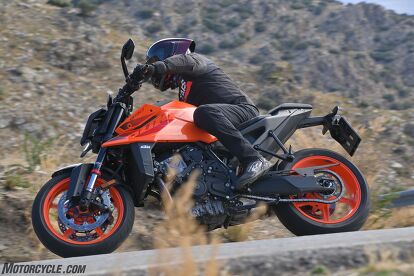
- Helmet: Alpinestars Supertech R10
- Jacket: Alpinestars SMX Air
- Airbag: REV’IT! Avertum Tech-Air
- Gloves: Alpinestars Equinox Gore Tex X-trafit (Discontinued)
- Pants: Alpinestars Copper v3 Riding Jeans
- Shoes: Alpinestars Superfaster
2024 KTM 990 Duke Specifications | |
|---|---|
Engine Type | Liquid-cooled, four-valve, DOHC Parallel-Twin, 4-stroke |
Displacement | 947 cc |
Bore x Stroke | 92.5 mm / 70.4 mm |
Compression Ratio | 13.5:1 |
Transmission | 6 gears |
Fuel System | Electronic Fuel Injection |
Clutch | Cable-operated PASC Slipper clutch |
Ignition / Engine Management | Bosch EMS with RBW |
Traction Control | MTC (lean angle sensitive, 3-Mode disengageable + Track mode optional) |
Frame | Chromium-Molybdenum-Steel frame using the engine as stressed element, powder coated |
Subframe | Aluminum, powder coated |
Handlebar | Aluminum, tapered |
Front Suspension | WP APEX 43 (fully adjustable) 5.5-inch travel |
Rear Suspension | WP APEX Monoshock (fully adjustable), 5.9 inches of travel |
Front Brake | 2 × four-piston, radially mounted caliper, brake disc Ø 300 mm |
Rear Brake | 2-piston caliper, brake disc Ø 240 mm |
ABS | Bosch 9.3 MP Two Channel (Supermoto ABS) |
Front Wheel | Cast aluminum, 3.50 x 17” |
Rear Wheel | Cast aluminum, 5.50 x 17” |
Front Tire | 120/70 x 17 |
Rear Tire | 180/55 x 17 |
Rake / Trail | 24.2° / 3.8 inches |
Wheelbase | 58.11 ± 0.59 inches |
Ground Clearance | 8.1 in |
Seat Height | 32.4 in |
Fuel Capacity | 3.8 gallons |
Dry Weight | 394 pounds (claimed) |
We are committed to finding, researching, and recommending the best products. We earn commissions from purchases you make using the retail links in our product reviews. Learn more about how this works.
Become a Motorcycle.com insider. Get the latest motorcycle news first by subscribing to our newsletter here.

Troy's been riding motorcycles and writing about them since 2006, getting his start at Rider Magazine. From there, he moved to Sport Rider Magazine before finally landing at Motorcycle.com in 2011. A lifelong gearhead who didn't fully immerse himself in motorcycles until his teenage years, Troy's interests have always been in technology, performance, and going fast. Naturally, racing was the perfect avenue to combine all three. Troy has been racing nearly as long as he's been riding and has competed at the AMA national level. He's also won multiple club races throughout the country, culminating in a Utah Sport Bike Association championship in 2011. He has been invited as a guest instructor for the Yamaha Champions Riding School, and when he's not out riding, he's either wrenching on bikes or watching MotoGP.
More by Troy Siahaan



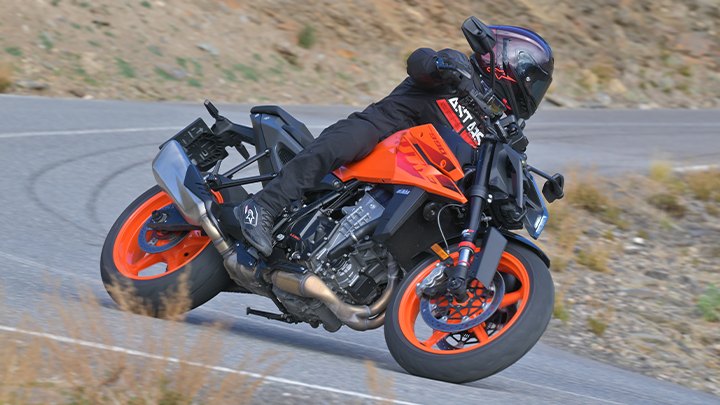



































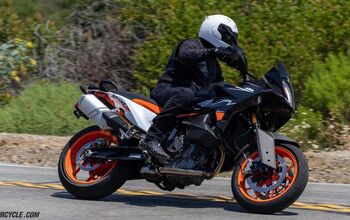

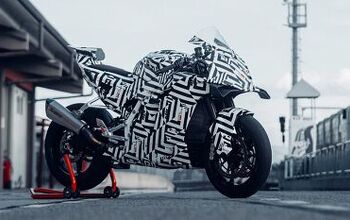

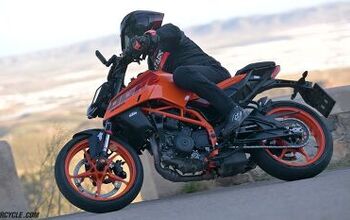
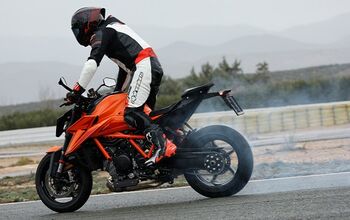

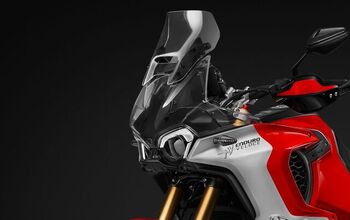
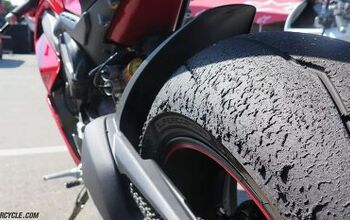






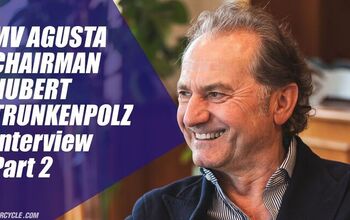
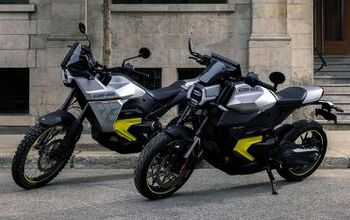

Comments
Join the conversation
The new KTM 990 Duke is a favorable replacement for the 890 Duke R, not that there was anything wrong with the 890 R, it was solid. The 990 Duke is up 2 hp and 3 more lb-ft torque over the 890 R. And it’s about 4.5 lbs. lighter. Best of all, it’s less expensive at $12,500 vs 2023 890 Duke R price of $12,950. More powerful, lighter, and less expensive---win, win, win! Also, for those worried about KTM’s China connection with CFMOTO, the 990 Duke is manufactured in KTM’s Mattighofen, Austria plant. I wouldn’t call the bike a middleweight at 947cc, more of a middleweight plus or upper-middleweight, much like the Z900 (948cc) and the Ducati Monster Plus (937cc).
Hi Troy, i already have this bike, mostly to use it as a learing tool for trackdays after going early this year to YCRS. At this "begginer" ( to say the least) level, should i worry about anything here or i need to address something quite "quickly"?